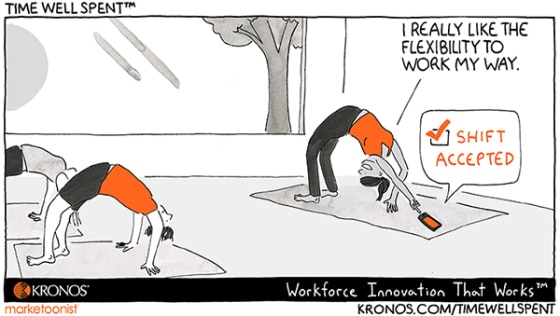Employees Want Flexible Work – Friday Distraction
(Editor’s Note: Today’s post is brought to you by our friends at Kronos, a leading provider of workforce management and human capital management cloud solutions. Want to create an inspired workforce? Check out Kronos CEO Aron Ain’s new book “Work Inspired: How to Build an Organization Where Everyone Loves to Work”. Enjoy the article!)
The title of today’s post says it all. Employees want flexible work. But what exactly does that mean? I know there’s a never-ending debate about whether to call something work-life balance or work-life integration. Is that what flexible work means? Or is that more of an outcome or result of having flexible work?
Today’s Time Well Spent cartoon from our friends at Kronos made me think that the definition of flexible work is two-fold with the focus on “flexible”.
Flexible work means that employees have the ability to be flexible when it comes to getting work done. Having flexibility doesn’t mean the quality of the work changes. Or that deadlines change. Those must be met. Flexible work means focusing on results not facetime. So flexible is about getting the work done the employee’s way. It means employees have the flexibility to work out the details on their own.
The other aspect of flexible work has to do with technology. Instead of waiting for a meeting or filling out a form, employees can use technology to keep others in the loop. They can work in the morning or in the evening. They can work on the weekend. This doesn’t mean that shifts can go uncovered or the operation will suffer. Flexible work means that employees can communicate their work needs in a flexible manner.
So, I wonder when we talk about flexible work if we’re describing a situation where 1) people have flexibility in how the work gets done and 2) they have flexibility in when the work is done.
Just like I’ve done here, organizations need to decide their definition of flexible work. I can see it being different in each organization. They should also clearly define what the outcomes of flexible work are. I can see situations where employees have some flexibility where their work is concerned but it doesn’t bring any level of work-life balance.
In addition, organizations promoting flexible work to candidates need to explain what that looks like. This could become an issue if a job candidate thinks they’re working for one type of “flexible work” company when, in fact, they’re working for another.
While I like my definition, I’m not here to say one definition of flexible work is better than another. But I hope we can agree there is some opportunity for the definition to be misinterpreted. Flexible work is too important of a benefit to have employees feel disappointed they’re not getting what they signed up for.
16